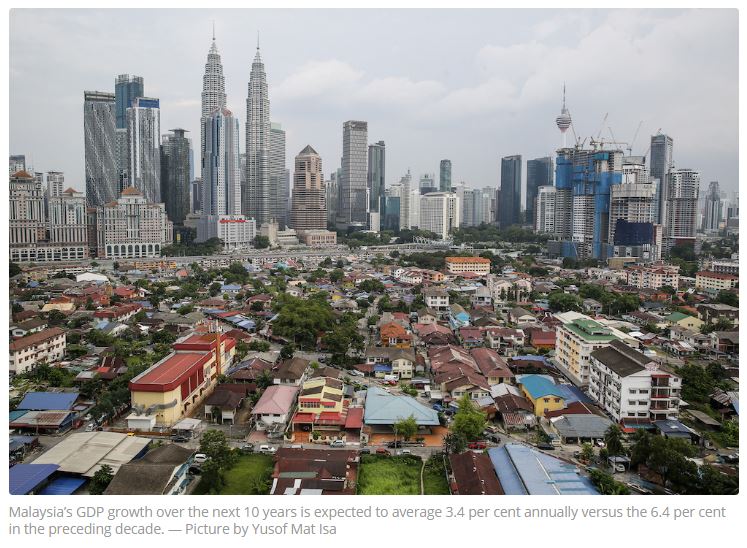Malaysia’s political uncertainty seen keeping country stuck in middle-income trap for next decade
KUALA LUMPUR, June 25 — Malaysia’s bid to rise in the economic value chain is set to stay stagnant, according to Fitch Macro Country Risk and Industry Research that predicted the country’s growth for the coming 10 years to be half what it was in the past decade.
The Fitch Solutions unit published a report today that said Malaysia has already exhausted its potential for growth via low-level industrialisation and must urgently upgrade its economy to escape the so-called “middle-income trap”.
“However, political uncertainty and stalling reform momentum amid a shift toward populism is likely to present serious risks to any such strategy’s success over the coming decade,” the research firm said.
“Combined with less favourable demographics and reduced fiscal space to cushion against future negative shocks to the economy, these factors all spell a much lower growth rate over the coming decade.”
Malaysia’s GDP growth over the next 10 years was expected to average 3.4 per cent annually versus the 6.4 per cent in the preceding decade as a result, it added.
Malaysia had needed the higher average rate of growth to achieve the Vision 2020 goal of gaining developed nation status this year but has already abandoned this target. The lower expansion rate would mean the ambition would also not be possible by 2030.
Citing the world-stopping Covid-19 pandemic, the Fitch Solutions unit said it was an “inopportune” time for Malaysia to be bogged down by the messy transition away from the one-party rule under Barisan Nasional that had lasted over six decades.
Among others, it said the political situation could distract the country’s administrators at a time when multinationals are looking to shift the bases of operations away from China for more diversity and resilience, as this was a trend upon which Malaysia could capitalise.
“Malaysia would essentially be starting on the back foot against regional competitors, especially Vietnam, in the race to attract foreign direct investment.”
Matters will be exacerbated as politicians could regress towards populism in an attempt to consolidate their positions, which the research firm said would come at the cost of a worsening business environment.
It also perceived an increased risk of corruption and graft in the country predicated primarily on the repeated defections of politicians and lawmakers between the two main coalitions jostling for control of the government.
Coalition and party heads could also employ political patronage to acquire and ensure loyalty towards them, Fitch Macro Country Risk and Industry Research said when pointing out the rash of political appointments at government-linked corporations at the moment.
Tan Sri Muhyiddin Yassin was appointed the prime minister in March after his informal Perikatan Nasional coalition seized power from Pakatan Harapan after the latter administration collapsed due to Tun Dr Mahathir Mohamad’s resignation.
After resigning, however, Dr Mahathir mounted a campaign to be reappointed in the position and has submitted a motion of no-confidence against his successor.
Muhyiddin is also said to be eyeing an early general election in the midst of the global Covid-19 pandemic in order to secure his personal mandate and dispel views that his coalition came to power via the “backdoor”.
However, political analysts told Malay Mail that it was not certain that Muhyiddin would be returned to the position even if PN wins the expected general election, which would in turn lead to further upheaval in Putrajaya.
Source: https://www.malaymail.com/news/malaysia/2020/06/25/malaysias-political-uncertainty-seen-keeping-country-stuck-in-middle-income/1878690


 Thailand
Thailand




